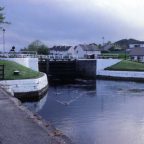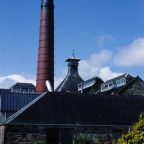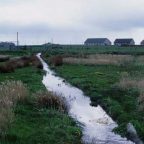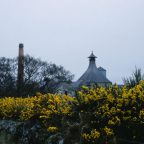Clynelish Distillery(7 May 2003)

Clynelish蒸留所の歴史は古く、1819年創業で、スコットランドで最も古い蒸留所の一つだろう。でも現在Clynelishを名乗る生産設備は1969年から使用された近代的な設備で大きな生産能力があり、Teaninichと共にUDV社の主要蒸留所になった。そして本来のClynelishはBroraと名を変えた。
原料は一緒だろうけど生産設備が全く変わるので味も当然変わる。しかし懸念されたほどではなかったようで、今ではClynelishは北ハイランドを代表するモルトウィスキーとなっている。と同時に1983年に操業を停止したBroraは着実に幻の酒への道を歩んでいる。
私もClynelishとBroraは飲む機会の多い、お気に入りのウィスキーの一つだ。もっとも私のボキャブラリーの中に”嫌いなウィスキー”というフレーズはない。
Clynelish Distillery was established in 1819. It’s one of the oldest distilleries in Scotland. However, equipments of making whisky called Clynelish has been used since 1969. It’s a modern and large productive capacity. Clynelish is one of the main distilleries of United Distilleies, and original Clynelish was named Brora.
Material of making whisky for Brora and Clynelish would be same, but equipments are different. Most people thought that taste of Clynelish would change and new Clynelish wouldn’t be a good whisky. However, Clynelish has been one of the best malt whisky of Northern Highland, simultaneously Brora, which have stoped making whisky since 1983, would certainly be rare whisky.
I often drink Clynelish and Brora, those are my favorite malt whisky, although I don’t have a word “hate whisky” in my vocabulary.
River Brora(8 May 2003)
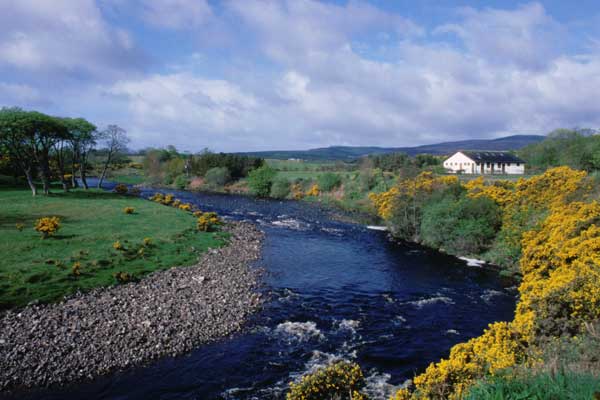
River Broraは町の西側にあるLoch BroraからMoray Firthへと流れる。スコットランドでも有名なサーモンの川として有名と聞いていたのでどんな大きな川かと思ったけど、それ程大きな川ではなかった。釣りをしている人でもいるかと思ったが美しい川と静かな流れだけがそこにあった。川岸には色とりどりの花が美しい新緑に映えている。よく見るとつくしやわらびが芽を出していた。ちょうど日本の3月末~4月上旬ぐらいといっしょなのだろう。この美しい風景の中でおいしいウィスキーは育まれる。
ふと、つくしやわらびは英語で何というのだろうと思った。生えているのだから英単語もあるだろうとさっそく電子辞書で調べると、つくしはhorsetail、わらびはbrackenとなっていた。こういう地道な努力が英語のボキャブラリーを増やす。よし、今度使おう・・・って使う機会があるのだろうか。よく考えるとあまり実用性のない単語ではある。欧米人がつくしやわらびを食べるとは思えないし、食べないのならば地味な、忘れ去られた植物のような気がする。
River Brora flow from Loch Brora into Moray Firth. I’ve heard that River Brora was famous for sarmon fishing, so I supposed that it was a large river. However it wasn’t so large and nobody did fishing. There was only beautiful stream, and colorful flower was in broom on the bank of river. It matched fresh green. Whisky is matured in such a beautiful environment.
I found “Tukushi” and “Warabi” on the bank of river. Those are a kind of stuff for Japanese cuisine in spring. We sometimes eat them to cook a salad. Season was same as the end of March or the start of April in Japan.
I thought what “Tukushi” and “Warabi” said in English casually. If there were “Tukushi” and “Warabi” in Scotland, there would be the word of English. I checked them by electronic dictionary immediately, so “Tukushi” was called horsetail, “Warabi” was called bracken in English. Two more words expanded my vocabulary.
However, I think those aren’t popular foods and people doesn’t eat them in Western countries. I wouldn’t usually use those words for conversation in future.

